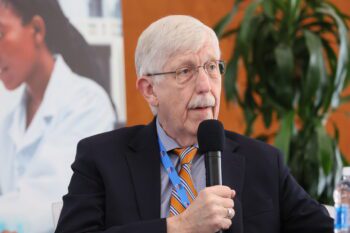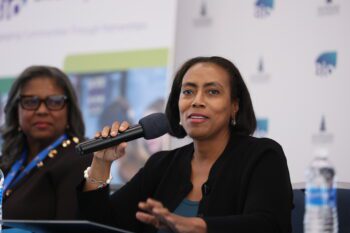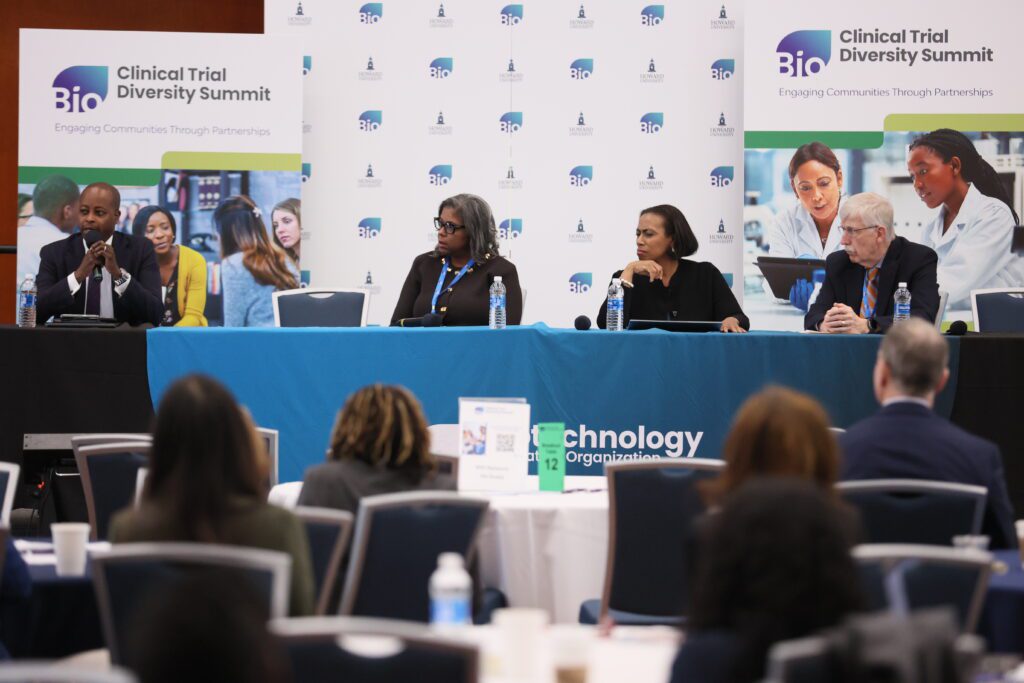“We are seeing an ongoing lack of participation by diverse groups in trials,” said Wayne Frederick, M.D., MBA, President Emeritus of Howard University and Interim CEO of the American Cancer Society and ACS CAN, introducing a panel at the Biotechnology Innovation Organization (BIO) Clinical Trial Diversity Summit at Howard University on November 19. This has a wide-ranging impact on health equity.
Case in point: Black individuals comprise less than 10% of cancer clinical trials despite being disproportionately affected by cancer. This has a real-world impact—for example, despite advances in treatment, there is a widening gap in prostate cancer outcomes, with Black men facing higher risk than white men.
Although many factors contribute to the lack of diversity in clinical trials, the top issue is access, continued Dr. Frederick.
How do we promote greater clinical trial diversity and, therefore, health equity? A panel of experts explored solutions.
Clinical trial diversity is the path to health equity

Increasing diversity in clinical trials is the way to health equity, said former NIH Director Francis Collins, M.D., Ph.D., Science Advisor to the President and co-chair of the President’s Council of Advisors on Science and Technology (PCAST).
While the bad news is that “we’re not there yet,” the good news is that diversity efforts “can be successful if they’re carefully designed and appropriately implemented.”
In fact, two such studies have already shown success. First, All of Us, a survey of 800K+ people, seeks to gain insights into why people get sick, how to stay healthy, and what makes us unique. Obviously, this survey had to be diverse early on to truly represent “all” of us, explained Dr. Collins. Indeed, 49% of participants are racial or ethnic minorities, showing “what can be done if you make [clinical trial diversity] not just a nice to have but essential.”
The second example, continued Dr. Collins, is the COVID-19 vaccine trials, which had diversity requirements. The Moderna trial was 37% racial/ethnic minorities, “vastly higher than most people thought would be possible,” thereby demonstrating that the vaccine was safe and effective for all populations.
“If somebody tries to say that it’s just too hard to enroll diverse participants in a trial, then you haven’t tried hard enough,” he noted.
How to overcome barriers to health equity

“We know that it’s all about inviting people in and asking them,” said Cheryl Anne Boyce, Ph.D., Associate Commissioner for Minority Health at the Food and Drug Administration’s Office of Minority Health and Health Equity. “We need to make sure that we’re asking and that we’re asking in the right way.”
Dr. Boyce identified three priorities: equity in voices (communicating with people “the way they want to be communicated with”), equity in data, and equity in enrollment (ensuring trials represent the populations they are intended to serve).
Andrea Hayes Dixon, M.D., FACS, FAAP, Dean of the Howard University College of Medicine and VP of Clinical Affairs, noted two additional priorities: access to care—not only access to a hospital but also specialists and clinical trials—and ensuring we have providers from diverse populations, which studies have shown helps patients live longer. On the second point, the challenge, said Dr. Dixon, is that we don’t have Black and Brown doctors in every specialty in the United States, so education is a key piece of the puzzle, too.
“Trust is so important to health equity,” said Dr. Frederick. However, events like the Tuskegee Syphilis Study and the unauthorized use of Henrietta Lacks’ cells have left a legacy of distrust in clinical research among Black and Brown communities.
Gaining trust is essential when considering groundbreaking therapies, like gene therapies for sickle cell disease, which disproportionately affects Black populations. It’s important to ensure that patients can connect with doctors, advocates, and even other patients who look like them and who can share firsthand experiences with these breakthroughs, explained Dr. Collins. These interactions can be key to fostering confidence in future clinical trials.
The role of education in cultural competency, addressing misinformation

In 1931, 3% of medical students were Black men. Today, 3% of medical students are Black men.
“We’ve made zero progress in well over 100 years,” said Dr. Frederick.
In addition to boosting the numbers of diverse physicians and medical students, “cultural competency is really critical,” said Dr. Dixon. At Howard, medical students are exposed to diverse ethnic groups and trained to communicate effectively—for example, using the word “houselessness” instead of “homelessness” and tailoring dietary advice to align with religious preferences.
Dr. Dixon shared a story about a patient who wasn’t taking her medication because the instructions said to “take with food,” and the patient explained she didn’t have food. Similarly, Dr. Frederick said he once called a patient who missed her chemotherapy appointment, explaining to her the importance of the treatment. She explained that she missed the appointment because she had to go to work.
“It’s not just about looking like the patient but recognizing you have to meet patients where they are,” said Dr. Frederick.
Education is key to combating misinformation, as well.
“How do you immunize people against misinformation?” asked Dr. Collins. By ensuring trusted community leaders deliver accurate information, we can help counter the effects of misinformation campaigns.
“People trust those they know,” said Dr. Boyce. Ensuring messengers have lived experience can make a meaningful difference in getting the right information to the right people.
Removing barriers to clinical trial participation

The speakers agreed that addressing logistical barriers—like providing transportation, meals, and other support—is essential to improving trial participation. Decentralizing trials can also make them more accessible.
“People can’t afford to donate time and miss work to participate in a trial,” said Dr. Collins. “Make it possible for them to participate.”
“The trust factor is important,” added Dr. Dixon. Providing support, like rides, is helpful, but it’s just as important to ensure participants feel like true partners in the trial—receiving clear, comprehensible information and support beyond the trial itself.




